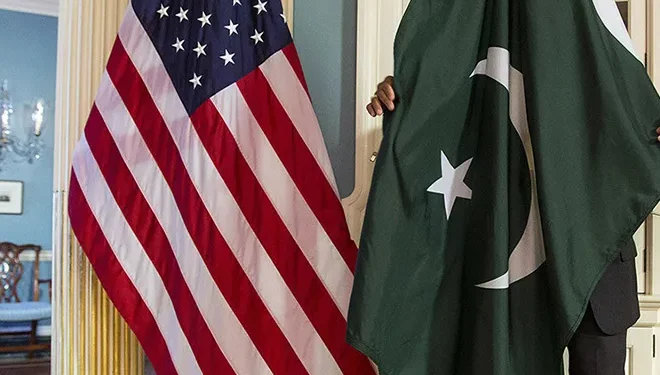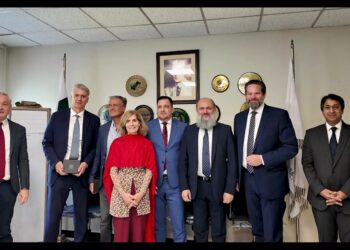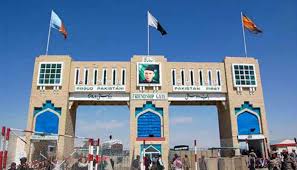ISLAMABAD: Pakistan and United States of America (USA) are likely to finalize new trade deal, as successful talks were held between both sides.
On June 24, 2025, Finance Minister Muhammad Aurangzeb Holds Virtual Meeting with US Commerce Secretary Howard Lutnick
A virtual meeting took place between Mr. Muhammad Aurangzeb, Pakistan’s Finance Minister and Howard Lutnick, United States’ Commerce Secretary on US Reciprocal tariffs on June 24 , 2025 .
Both sides showed satisfaction on the on-going negotiations and resolved to conclude the trade negotiations next week. It was also resolved that further to the trade agreement, a partnership, based on strategic and investment interests, would be concluded in due course covering areas of mutual interest.
The discussion focused on meaningful engagement in trade, investment and deepening economic ties mutually beneficial to both sides with technical level trade related discussions to be concluded next week.
According to the US, Pakistan’s average Most-Favored-Nation (MFN) applied tariff rate was 10.3 percent in 2023 (latest data available). Pakistan’s average MFN applied rate was 13.0 percent for agricultural products and 9.9 percent for non-agricultural products in 2023 (latest data available). Pakistan has bound 98.6 percent of its tariff lines in the World Trade Organization (WTO), with an average WTO bound tariff rate of 60.8 percent. For agricultural products, the average WTO bound rate is 96.2 percent. The average WTO bound rate for nonagricultural products is at 55.2 percent. Despite the reduction of applied tariff rates since 2013, U.S. companies have cited concerns that Pakistan has been imposing high tariff rates and, in some cases, additional duties, on products such as automobiles and finished goods. In addition, Pakistan grants sector- and product-specific import duty exemptions, concessions, and protections through the promulgation of statutory regulatory orders (SROs). SROs may be issued without providing for stakeholder consultations or allowing importers time for implementation and compliance. Under previous International Monetary Fund (IMF) programs, Pakistan pledged to limit the use of SROs to genuine emergencies. However, SROs continue to be issued, and Pakistan has not provided a timeline for their removal.
Pakistan permits the importation of certain goods only by the public sector or industrial consumers (e.g., active ingredients for the formulation or manufacturing of pesticides). Some imports require approvals from federal-level ministries such as the Ministry of Climate Change, Ministry of Interior, and the Ministry of National Health Services, Regulations and Coordination. Imports of certain products, including food colors, waste, parings, and scrap plastics, must receive official certification by the exporting country or by a specialized pre-shipment inspection company.
On July 11, 2024, Pakistan issued SROs 1021 and 1022, which banned the import and export of wheat. Pakistan officials have stated that the bans were put in place to stabilize local prices given record domestic production and high stocks. Consequently, Pakistan has not imported wheat during the current marketing year. The Government may review the import ban in the latter part of the marketing year, but imports are unlikely to be more than 300,000 tons.
U.S. food and consumer product exporters have expressed concerns regarding a lack of uniformity in customs valuation in Pakistan that negatively affects U.S. stakeholders. Similarly, in the machinery and materials sectors, there are reports that customs officials have erroneously assessed the customs value of goods based on a set of minimum values rather than the declared transaction value. U.S. companies have reported being adversely affected by Customs Rules 389 and 391. Customs Rule 389 requires the placement of a physical invoice and packing list in the shipping container, while Customs Rule 391 places the responsibility of including such documents, and liability for failure to comply, on the owner of the goods and the carrier. Such rules pose compliance challenges for companies that use intermediaries, re-invoicing, or the storage of goods at various points during transit. They also create additional burdens for shippers who are required by other countries’ customs requirements to provide this information only through electronic filings and may, therefore, not have paper documentation available. Many companies’ invoicing, accounting, and shipping systems do not permit the generation of invoices and packing lists prior to the departure of the goods from the company’s production or storage facilities. Customs officials impose penalties on companies lacking invoicing systems incapable of producing paper documentation for each container. While Pakistan has shown openness to addressing the issue, and U.S. authorities have worked with Pakistan’s Federal Board of Revenue (FBR) to that end, the rules remain formally in place and customs officials can implement them at any time. Pakistan notified its customs valuation legislation to the WTO in May 2001, but has not yet responded to the WTO Checklist of Issues that describes how the Customs Valuation Agreement is being implemented.
Pakistan generally accepts imported food as packaged in the exporting country. A notable exception, however, is food packaging for vegetable oil. Pakistan requires refined vegetable oil to be imported in bulk for re-packaging. In February 2019, Pakistan issued SRO 237 but failed to notify the WTO Committee on Technical Barriers to Trade (TBT Committee) for comment. This measure mandates that all edible product shipments include a halal certificate and prohibits the use of stickering, overprinting, or stamping to meet the requirements, even on an interim basis. Although Pakistan resolved the issue for wholesale bulk food items by permitting the use of stickers, the issue remains for retail sales. SRO 237 also requires all products to have 66 percent of shelf-life remaining from the date of manufacture. When taken together, manufacturers report that these onerous requirements introduce significant uncertainty and operational barriers. After notification requests from the United States, Pakistan eventually notified SRO 237 to the WTO TBT Committee in May 2020. The United States raised concerns with Pakistan’s requirements at WTO TBT Committee meetings between November 2019 and May 2020. The United States continues to monitor updates to SRO 237. During the April 2024 TIFA intercessional meeting, U.S. and Pakistan officials discussed SRO 237 and additional clarifications needed on Pakistan’s import regulations with a particular focus on labeling requirements.
Pakistan continues to ban imports of beef and beef products from the United States. However, during the February 2023 TIFA Council meeting, Pakistan and the United States reached an agreement in principle on an export certificate that would re-open the market for U.S. beef. Finalization of the agreement was still pending as of December 2024. In October 2022, Pakistan customs authorities detained two shipments of U.S. genetically engineered (GE) soybeans. The MNFSR reiterated the requirement to apply for an import license for GE products, a process at the time stymied by a lack of implementing regulations for approval of GE soybeans for food, feed, and processing (FFP). In December 2022, Pakistan formed a committee to evaluate the issue. On November 24, 2023, Pakistan’s cabinet passed amendments to the Biosafety Rules aimed at restarting the importation of GE commodities for FFP purposes. As per the approved Biosafety Rules, the Director General of Environment at the Ministry of Climate Change received 16 applications for the import of soybeans that were approved by the Technical Evaluation Committee. In October 2024, the National Biosafety Committee (NBC) approved the requests of Pakistani importers to import GE soybeans under the new Biosafety Rules. U.S. companies expect Pakistani imports of U.S. soybean to resume in the first quarter of 2025. The U.S. Government continues to engage with the Government of Pakistan on this issue. Following publication of the NBC meeting minutes, the approved applicants will need to request an import license from Pakistan’s Environmental Protection Agency before they can begin shipping soybeans.
Pakistan released a final version of the Personal Data Protection Act in early 2025. The draft act establishes strict processing requirements for “certain personal data” and empowers the Government of Pakistan to restrict transfers of “certain personal data” to jurisdictions outside of Pakistan. It also places additional requirements on organizations processing data who meet certain thresholds and are identified as “significant” by the Commission. The draft act does not clearly define the thresholds, but requirements include registering a data protection officer. The draft act permits the transfer of personal data outside of Pakistan only in limited circumstances, such as when the service provider has obtained explicit consent from the data subject to transfer of data outside of Pakistan, when a binding contract is in place, or when the data is transferred to a country that provides an adequate data protection legal regime, among others.
Pakistan routinely blocks access to Internet services for hosting content deemed to be blasphemous or immoral, or on grounds that such services can be used to “undermine national security.” Under the Prevention of Electronic Crimes Act (PECA), Pakistan routinely blocks entire social media platforms or demands that sites geo-block posts considered “unlawful online content.” An e-Safety Bill and the pending establishment of a Digital Rights Protection Authority and National Center for Cyber Investigations would increase financial and criminal penalties associated with online speech.
Pakistan generally permits foreign investment and introduced a new Pakistan Investment Policy (PIP) in 2023 to enhance its investment promotion efforts and attract foreign investment. Pakistan continues to limit foreign ownership through equity caps in certain sectors including agriculture, aviation, banking, media, insurance, and securities. Ostensibly to combat tax evasion, in which companies report operating losses but remit royalties, Pakistan has limited foreign investors’ remittance of royalty payments (except in the manufacturing sector) to a maximum of $100,000 for the first payment, with subsequent payments capped at 5 percent of net sales for the following five years. Although Pakistani law allows repatriation of profits, subject to restrictions listed in Chapter 14, section 15 of the State Bank of Pakistan (SBP) Foreign Exchange Manual, U.S. and other companies continue to face bureaucratic hurdles repatriating profits, dividends, and royalties from Pakistan, generally coinciding with the government’s focus on stemming outflows of U.S. dollars. Local franchises of U.S. brands report limitations and extended delays in remitting funds to the United States as a result of SBP policies. Balance of payments challenges in 2022 and 2023 further exacerbated repatriation delays. The 2023 PIP reiterated the right of foreign investors to repatriate investment-related capital, and in 2024, U.S. and other foreign investors reported fewer repatriation issues as Pakistan’s balance of payments position stabilized. According to the SBP, foreign repatriations increased to $2.2 billion during Pakistan’s fiscal year 2024 (July 2023 to July 2024), compared to $331 million in fiscal year 2023. U.S., global, and domestic firms reported facing arbitrary restrictions on letters of credit due to the balance of payments situation in 2022 and 2023, but reported fewer problems in 2024. Stakeholders reported delays in banks’ issuance of letters of credit, on account of informal limitations by the SBP on commercial banks borrowing foreign currency through the interbank market. Industry stakeholders report that contract enforcement can be difficult for U.S. and other foreign investors in Pakistan due to significant delays and lack of enforcement of court rulings.
Pakistan has one of the lowest tax compliance and tax-to-Gross Domestic Product ratios in the world, 9 percent in FY2024. Pakistan relies heavily on multinational corporations for the revenue generated by tax collection. Foreign investors in Pakistan regularly report that both federal and provincial tax regulations are difficult to navigate, frequently citing the lack of transparency in the assessment of taxes. Improving and broadening tax collection is a key focus of the IMF’s Extended Fund Facility (EFF) for Pakistan, approved in September 2024. Under the program, the target is for Pakistan to increase its tax revenues to $40 billion in FY2025, an increase of $6.4 billion from the collections made during FY2024. Under the EFF, the government has also committed to expanding taxation into the under-taxed retail and agriculture sectors and to improving tax administration. However, Pakistan authorities have long delayed key politically sensitive tax reforms recommended under previous IMF programs. U.S. companies have experienced increased pressure from the FBR to prepay anticipated tax liabilities and have expressed concern that many of their local competitors still do not pay taxes at all or engage in tax evasion. For example, Pakistan amended its tax laws in June 2024 to limit corporate tax deductions on marketing expenses for firms that pay royalties, a provision that multinational companies complain is designed to discriminate against international companies. The U.S. Government has repeatedly engaged with the Pakistan Government on issues involving unfair and disproportionate taxation of U.S. companies and continues to reinforce the importance of Pakistan broadening its tax base.
U.S. companies cite corruption and a weak judicial system as substantial disincentives to foreign investment in Pakistan. Pakistan’s federal anticorruption agency, the National Accountability Bureau (NAB), provides a legal framework to combat corruption. However, business and civil society stakeholders have expressed reservations about the body’s effectiveness and perceived politicization. The NAB’s broad exercise of its remit to investigate government operations and business dealings have led to a number of cases where it reopened established policies and targeted reputable businesses, potentially dissuading foreign investors and making officials reticent to exercise authority.
Pakistan raises trade concerns with EU over Ethanol duty withdrawal, Basmati rice GI issue
ISLAMABAD: Pakistan has raised trade concerns with the European Union (EU) on withdrawal of duty concessions on Pakistan’s ethanol exports...
Read more














